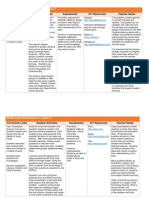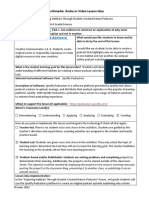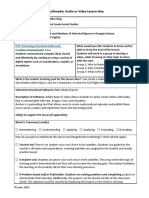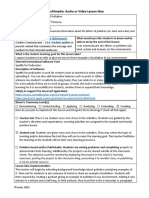0 ratings0% found this document useful (0 votes)
35 viewsUnit Overview
Unit Overview
Uploaded by
api-263703913Copyright:
© All Rights Reserved
Available Formats
Download as DOCX, PDF, TXT or read online from Scribd
Unit Overview
Unit Overview
Uploaded by
api-2637039130 ratings0% found this document useful (0 votes)
35 views3 pagesOriginal Title
unit overview
Copyright
© © All Rights Reserved
Available Formats
DOCX, PDF, TXT or read online from Scribd
Share this document
Did you find this document useful?
Is this content inappropriate?
Copyright:
© All Rights Reserved
Available Formats
Download as DOCX, PDF, TXT or read online from Scribd
Download as docx, pdf, or txt
0 ratings0% found this document useful (0 votes)
35 views3 pagesUnit Overview
Unit Overview
Uploaded by
api-263703913Copyright:
© All Rights Reserved
Available Formats
Download as DOCX, PDF, TXT or read online from Scribd
Download as docx, pdf, or txt
You are on page 1of 3
Lesson Activities ICT Resources
1 Introduce problem via Glogster
Learners watch a video recorded by the principle that reinforces and
encourages their involvement in the creation of the campaigns.
Teacher assigns students to groups (3 to 4 learners per group). Within groups
students us Bubbl Us to brainstorm what they know about the topic and what
they want to know.
Teacher assists students create a Wiki Page (explicit instruction). Rules and
expectations are outlined to promote safe, legal ethical online practices.
Glogster
http://edu.glogster.com/
Interactive Whiteboard- play the video through
media player
Bubbl Us
https://bubbl.us/
Wikispaces
http://www.wikispaces.com/
2 Students review the problem using Glogster and video file.
In their assigned groups, students discuss the problem and possible
solutions. Students use their created Wiki Page to share ideas and concepts.
Teacher scaffolds how to use talking animals on Fodey (explicit instruction).
Within each group, students separate into pairs. Using talking animals on
Fodey, learners select one possible solution on their wiki page and discuss it
with their peer via the talking animal.
Teacher explicitly instructs students how to create and design a Voki avatar
for their next lesson.
Glogster
http://edu.glogster.com/
Interactive Whiteboard- play the video through
media player
Wikispaces
http://www.wikispaces.com/
Talking animal- Fodey
http://www.fodey.com/
Voki
http://www.voki.com/
3 Students review the problem and possible solutions.
Each group orally presents their possible solutions to the class and teacher.
Students pose questions using Prezi to discover more information about the
topic.
Learners video conference with their local RSPCA through Skype. The
RSPCA answers the questions students created using Prezi.
Students generate their final solution that will solve the problem. Once all
group members agree with the final solution, students will create a Voki to
present to the class.
Prezi
http://prezi.com/
Skype
http://www.skype.com/
Voki
http://www.voki.com/
4 As a class students discuss the features of a campaign. Teacher allows
students to communicate their understanding first, then adds details to extend
student knowledge. Students record features on a piece of butchers paper
for future reference.
Example of a campaign is shown to students. Teacher provides students with
a YouTube video and past work samples.
As a class, with the assistance of the teacher, students create a song
highlighting the features of a campaign (students use rhyme and lyrics of their
choosing).
YouTube
http://www.youtube.com/
Song Generator
http://www.song-lyrics-generator.org.uk/
5 Students work independently in their groups to draft their campaign. ICT
resources used throughout the term are used by students to create their
campaign.
Learners continuously update their Wiki Page to inform their group what they
have completed and what they must have to do.
Wikispaces
http://www.wikispaces.com/
6 Students select an ICT resource of their choice to construct a checklist of the
features of a campaign. This checklist is created as a class (majority is
student centred). Students use this checklist to evaluate their draft campaign
to ensure they are using the correct features.
Wikispaces
http://www.wikispaces.com/
ICT resource used previously in this unit of work.
In their assigned groups, students review their draft campaigns and complete
their finalised design. Students should still continuously update their Wiki
Page to inform their group what they have completed and what they must
have to do.
7 Learners are provided with 10-15 minutes rehearsal time.
Members from the local RSPCA and the school community
(parents/guardians, principal) arrive to listen to the campaigns.
Each student group presents their campaign.
Use Bubbl Us to brainstorm key concepts, interesting points and fun facts.
Print an A3 copy of the mind map to display in the classroom, along with each
groups campaign poster.
Bubbl Us
https://bubbl.us/
You might also like
- Club Activity ReportDocument4 pagesClub Activity ReportZaidiAbdulRahman50% (6)
- Sample Work Plan in MathDocument6 pagesSample Work Plan in Mathhilda garcia100% (4)
- Who This Book Is For: Complete Advanced 2nd Edition Is A Stimulating andDocument1 pageWho This Book Is For: Complete Advanced 2nd Edition Is A Stimulating andAOCNo ratings yet
- Filipino Prototype Syllabi CompendiumDocument218 pagesFilipino Prototype Syllabi CompendiumGenny Ann Socrates75% (4)
- Learning SequenceDocument3 pagesLearning Sequenceapi-263703913No ratings yet
- Multimedia Lesson PlanDocument2 pagesMultimedia Lesson Planapi-653299934No ratings yet
- Multimedia Audio Lesson IdeaDocument4 pagesMultimedia Audio Lesson Ideajoceleste16No ratings yet
- Itec 3100 m11 Multimedia Video Lesson Idea - Emma StallDocument3 pagesItec 3100 m11 Multimedia Video Lesson Idea - Emma Stallapi-553761170No ratings yet
- Multimedia Audio or Video LESSON IDEA Template2022Document3 pagesMultimedia Audio or Video LESSON IDEA Template2022bw10277No ratings yet
- Multimedia Audio or Video Lesson PlanDocument3 pagesMultimedia Audio or Video Lesson PlanJen KontzNo ratings yet
- Multimedia Audio or Video Lesson Idea Template2022Document2 pagesMultimedia Audio or Video Lesson Idea Template2022api-679387958No ratings yet
- Multimedia Audio or Video Lesson Idea Template2022Document3 pagesMultimedia Audio or Video Lesson Idea Template2022api-678572474No ratings yet
- Multimedia 1 TiffanyvacaDocument3 pagesMultimedia 1 Tiffanyvacaapi-723995035No ratings yet
- m04 Instructional Software Lesson Idea Ann-Dupree GoodsellDocument4 pagesm04 Instructional Software Lesson Idea Ann-Dupree Goodsellapi-525449450No ratings yet
- Multimedia Audio or Video Lesson Idea Template2022 1Document3 pagesMultimedia Audio or Video Lesson Idea Template2022 1api-724032377No ratings yet
- Description Project ActivitiesDocument3 pagesDescription Project Activitiesapi-262204481No ratings yet
- Destini Clark Multimedia LessonDocument3 pagesDestini Clark Multimedia Lessonapi-699471874No ratings yet
- BBPT Lesson PlanDocument2 pagesBBPT Lesson Planapi-515038311No ratings yet
- Multimedia Audio Video Lesson Plan 1Document3 pagesMultimedia Audio Video Lesson Plan 1api-654275072No ratings yet
- Online Learning Project BugscopeDocument2 pagesOnline Learning Project Bugscopeapi-412689064No ratings yet
- Multimedia Video Lesson Plan FinalDocument2 pagesMultimedia Video Lesson Plan Finalapi-631396855No ratings yet
- Lesson Plan Psa Educ380Document4 pagesLesson Plan Psa Educ380api-235894314No ratings yet
- Multimedia Audio or Video Lesson Idea Template2022Document3 pagesMultimedia Audio or Video Lesson Idea Template2022api-675578703No ratings yet
- Multimedia Video LessonDocument3 pagesMultimedia Video Lessonapi-631919097No ratings yet
- Lesson 4aDocument5 pagesLesson 4aapi-218476346No ratings yet
- Multimedia Audio Lession Idea - Yamina ChoudhuryDocument4 pagesMultimedia Audio Lession Idea - Yamina Choudhuryapi-724106001No ratings yet
- Multimedia Lesson PlanDocument3 pagesMultimedia Lesson Planapi-515094536No ratings yet
- 04 Beyond The Basic Prductivity Tools Lesson Idea TemplateDocument2 pages04 Beyond The Basic Prductivity Tools Lesson Idea Templateapi-464257729No ratings yet
- Multimedia Audio or Video Lesson Idea Template2022Document2 pagesMultimedia Audio or Video Lesson Idea Template2022api-653326359No ratings yet
- Audio Lesson - Itec 3100Document3 pagesAudio Lesson - Itec 3100api-653282837No ratings yet
- Multimedia Lesson PlanDocument3 pagesMultimedia Lesson Planapi-618492936No ratings yet
- VideolpDocument2 pagesVideolpapi-445292302No ratings yet
- Multimedia Lesson IdeaDocument2 pagesMultimedia Lesson Ideaapi-618168542No ratings yet
- Multimedia Audio or Video Lesson Idea JennaprestonDocument2 pagesMultimedia Audio or Video Lesson Idea Jennaprestonapi-724269635No ratings yet
- Multimedia Audio or Video Lesson Idea Template2022Document3 pagesMultimedia Audio or Video Lesson Idea Template2022api-653292818No ratings yet
- Multimedia Audio or Video Lesson Idea Template2022Document3 pagesMultimedia Audio or Video Lesson Idea Template2022api-724190473No ratings yet
- Final Multimedia Audio or Video Lesson Idea Template2022Document2 pagesFinal Multimedia Audio or Video Lesson Idea Template2022api-631555971No ratings yet
- Itec 3100 Lesson Plan TemplateDocument2 pagesItec 3100 Lesson Plan Templateapi-498392226No ratings yet
- Module 10 Final Project OutlintDocument7 pagesModule 10 Final Project Outlintapi-450363387No ratings yet
- Multimedia Audio or Video Lesson Idea Seren Thomas-JacksonDocument3 pagesMultimedia Audio or Video Lesson Idea Seren Thomas-Jacksonapi-692117732No ratings yet
- Multimedia Audio or Video Lesson Idea Template2022Document2 pagesMultimedia Audio or Video Lesson Idea Template2022api-675401673No ratings yet
- Multimedia Audio or Video Lesson Idea Template2022Document3 pagesMultimedia Audio or Video Lesson Idea Template2022api-679921567No ratings yet
- Completed-Multimedia Audio or Video Lesson Idea Template2022Document2 pagesCompleted-Multimedia Audio or Video Lesson Idea Template2022api-631448157No ratings yet
- Audio Lesson PlanDocument3 pagesAudio Lesson Planapi-618844521No ratings yet
- Multimedia Audio or Video Lesson Idea EbonymDocument4 pagesMultimedia Audio or Video Lesson Idea Ebonymapi-675398437No ratings yet
- Multimedia Audio or Video LessonDocument2 pagesMultimedia Audio or Video Lessonapi-653325112No ratings yet
- Multimedia Audio or Video Lesson IdeaDocument2 pagesMultimedia Audio or Video Lesson Ideaapi-652816243No ratings yet
- Henson-Multimedia Audio or Video Lesson IdeaDocument3 pagesHenson-Multimedia Audio or Video Lesson Ideaapi-676793276No ratings yet
- Multimedia Audio or Video LESSON IDEA Template2022Document3 pagesMultimedia Audio or Video LESSON IDEA Template2022karinabonilla2003No ratings yet
- Itec 3100 BBPT LP Alt 4thDocument2 pagesItec 3100 BBPT LP Alt 4thapi-515076839No ratings yet
- Multimedia Audio or Video Lesson Idea Template2022Document3 pagesMultimedia Audio or Video Lesson Idea Template2022api-653082939No ratings yet
- Multimedia Audio or Video Lesson Idea Template2022Document3 pagesMultimedia Audio or Video Lesson Idea Template2022api-675099340No ratings yet
- MultimediaDocument3 pagesMultimediaapi-675603419No ratings yet
- BlogentryDocument2 pagesBlogentryapi-445292302No ratings yet
- Online Project LessonDocument2 pagesOnline Project Lessonapi-391673750No ratings yet
- Persuasive Writing Lesson PlanDocument3 pagesPersuasive Writing Lesson PlanKim Lipford Powell100% (2)
- Genua Istc 541 Lesson Plan FinalDocument8 pagesGenua Istc 541 Lesson Plan Finalapi-519303926No ratings yet
- Multimedia Audio or Video Lesson Idea Template2022Document3 pagesMultimedia Audio or Video Lesson Idea Template2022api-724194656No ratings yet
- Historical FiguresDocument3 pagesHistorical Figuresapi-631755440No ratings yet
- Public Service Announcement Lesson PlanDocument7 pagesPublic Service Announcement Lesson Planapi-267989126No ratings yet
- Collinsn BBP Lesson PlanDocument2 pagesCollinsn BBP Lesson Planapi-449008394No ratings yet
- Multimedia Audio or Video Lesson Idea 2022 1 2 1Document2 pagesMultimedia Audio or Video Lesson Idea 2022 1 2 1api-653298085No ratings yet
- FossilsDocument2 pagesFossilsapi-515031436No ratings yet
- Jessica M. Wood: Social Studies AND German Teacher ProfileDocument3 pagesJessica M. Wood: Social Studies AND German Teacher Profilejmwood82No ratings yet
- SST Assessment ReportDocument3 pagesSST Assessment Reportapi-241979067No ratings yet
- Proposal Discovery LearningDocument11 pagesProposal Discovery Learningiwan bilautNo ratings yet
- Collaborative Learning For SEN:: The Role of The SENCODocument24 pagesCollaborative Learning For SEN:: The Role of The SENCOAndyBrookeNo ratings yet
- Esl RationalDocument4 pagesEsl Rationalapi-353922451No ratings yet
- Otidbamnn: Daily Lesson Plan For Mapeh 7: Physical EducationDocument2 pagesOtidbamnn: Daily Lesson Plan For Mapeh 7: Physical EducationNancy Jane Serrano Fadol100% (1)
- Lesson Plan in P.E (June 25)Document2 pagesLesson Plan in P.E (June 25)Camelah CadigoyNo ratings yet
- Listening Lesson PlanDocument3 pagesListening Lesson Planceylan000No ratings yet
- Portfolio: Myera A. BeloriaDocument26 pagesPortfolio: Myera A. BeloriaEdeson John CabanesNo ratings yet
- States of Matter LPDocument2 pagesStates of Matter LPAngela GiganteNo ratings yet
- Week G - PHILODocument3 pagesWeek G - PHILOAr Nhel DGNo ratings yet
- Educ7 Act1 SandiegoDocument3 pagesEduc7 Act1 SandiegoCindy Malabanan SanDiegoNo ratings yet
- Bertanya Dan Menjawab 2Document6 pagesBertanya Dan Menjawab 2arlikaNo ratings yet
- Resume For Science Teaching Position Walter Adam HoltDocument2 pagesResume For Science Teaching Position Walter Adam Holtapi-466501476No ratings yet
- Educator Mentor Discussion PromptsDocument6 pagesEducator Mentor Discussion Promptsapi-384083823No ratings yet
- Lesson Plan Format 1Document2 pagesLesson Plan Format 1lwkymgntNo ratings yet
- Sepep Written ReportDocument12 pagesSepep Written Reportapi-313721027No ratings yet
- Let's Make A Deal - EconomicsDocument8 pagesLet's Make A Deal - EconomicsAmanda CulpepperNo ratings yet
- Lashawn Brown Country Case Study-Interview ReportDocument5 pagesLashawn Brown Country Case Study-Interview Reportapi-367537236No ratings yet
- RPH34 SN T2 EngDocument3 pagesRPH34 SN T2 Engnorliza hadamanNo ratings yet
- Lac MapehDocument4 pagesLac MapehChristina Yssabelle100% (4)
- Edtpa Part C Task 3Document6 pagesEdtpa Part C Task 3api-353916112No ratings yet
- Abate Morgan Letter of Recommendation 4-4 3 1Document1 pageAbate Morgan Letter of Recommendation 4-4 3 1api-643735593No ratings yet
- CertPT Task 2 SampleDocument2 pagesCertPT Task 2 SampleDaniel AdameNo ratings yet
- DLL Tle Ea 6 WK 1Document6 pagesDLL Tle Ea 6 WK 1Franco Hicana LeonardoNo ratings yet
- Lesson Plan - E.L.a (Homophones)Document5 pagesLesson Plan - E.L.a (Homophones)diamondwallaceNo ratings yet

























































































